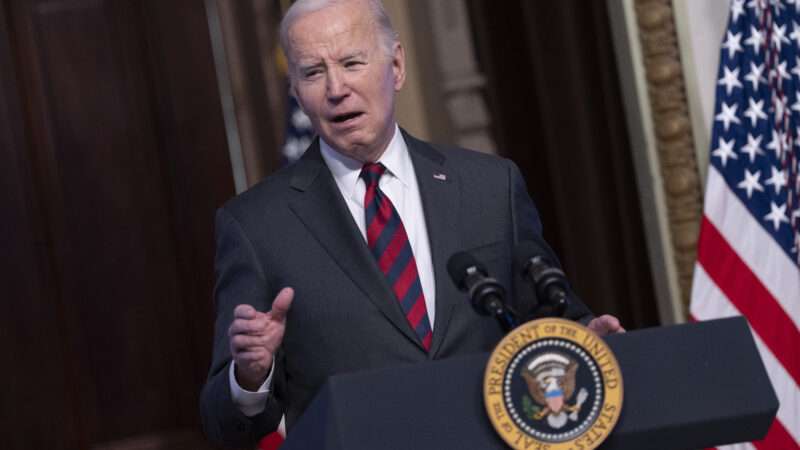
This week, the White House announced the launch of a Council on Supply Chain Resilience, created with the hope to "strengthen America's supply chains" and "lower costs for families."
Kinks in the supply chain are indeed partly to blame for the persistent inflation that has dogged American consumers for more than two years now. While inflation has fallen in recent months, the annualized rate remains over 3 percent; so-called "core inflation," which excludes food and energy, was at an annualized rate of 4 percent in October, double the Fed's target rate.
President Joe Biden delivered remarks from the White House on Monday to announce the new council's creation. He touted the lower inflation rate and falling grocery prices but admonished American companies for, in his view, not going far enough.
"Let me be clear: To any corporation that has not brought their prices back down—even as inflation has come down, even as supply chains have been rebuilt—it's time to stop the price gouging," Biden warned, imploring them to "giv[e] the American consumer a break."
.@POTUS: "To any corporation that has not brought their prices back down, even as inflation has come down, even as supply chains have been rebuilt – it's time to stop the price gouging." pic.twitter.com/IeKnLJjn7W
— The Hill (@thehill) November 27, 2023
The next day, White House Press Secretary Karine Jean-Pierre doubled down on Biden's warning, responding to a reporter's question about "price gouging" by saying that "the president's gonna continue to use his bully pulpit to call it out."
But Biden and Jean-Pierre are mistaken and seem to be confusing deflation with disinflation. The latter, as defined by the Federal Reserve Bank of St. Louis, is "a decrease in the rate of inflation," while the former is "a sustained decrease in the price level of goods and services."
Inflation has indeed declined for more than a year: In June 2022, inflation hit 9.1 percent, the highest single-month spike in over four decades. Between June 2022 and October 2023, the annualized inflation rate fell to 3.2 percent, a decrease of nearly two-thirds.
But that doesn't mean prices are falling. After all, a 3.2 percent annual rate still means that prices were 3.2 percent higher in October 2023 than they were in October 2022. And it's not expected to get better anytime soon, as Federal Reserve forecasts estimate core inflation will still be at 2.6 percent at the end of 2024.
Democrats have blamed "corporate greed" for the rise in inflation since 2021, even coining the term "greedflation" to describe it. But this doesn't explain why so many companies suddenly decided to be greedy just as the COVID-19 pandemic caused supply chain snafus and two successive presidential administrations spent trillions of dollars in record time.
But the intended audience for Biden's warning may not be corporations, but voters. "[Biden] needs to show voters that he's not just working to lower prices, he's fighting to do it," a Democratic strategist told The Messenger's Dan Merica. "Punching corporations for their record profits is a great way to show his economy isn't done, it's still a work in progress."
The post Biden Warns Companies To Bring 'Prices Back Down' Even as Inflation Persists appeared first on Reason.com.







